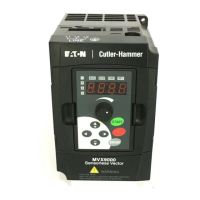Fuses and Circuit Breakers
MVX9000 User Manual 4-11
Start-Up
Procedures
Power-Up Test
Step 8: After wiring the inverter and motor, perform a power-up test. The
procedure that follows is designed for the first-time use of the drive. Verify the
following conditions before conducting the power-up test:
• The previous steps in this chapter have been followed.
• The inverter is new, and securely mounted to a non-flammable vertical
surface.
• The inverter is connected to a power source and motor.
• No additional wiring of the inverter connectors or terminals has been done.
• The power supply is reliable, and the motor is a known working unit.
• The motor is mounted, and is not connected to any load.
The following instructions apply to the power-up test, or to any time the inverter
is powered and operating. Please study the following instructions and messages
before proceeding with the power-up test.
1. The power supply must have fusing suitable for the load. Check the fuse size
chart presented in Table 4-1 if necessary.
2. Be sure you have access to a disconnect switch for the drive input power if
necessary. However, do not turn off power to the inverter during its
operation unless it is an emergency.
3. Turn the inverter’s front panel potentiometer to the MIN position (fully
counterclockwise).
CAUTION!
The operation of the inverter can be easily changed from low speed to
high speed. Be sure to check the capability and limitations of the
motor and machine before operating the inverter. Otherwise, there is
the danger of injury.
CAUTION!
If you operate a motor at a frequency higher than the inverter standard
default setting (50 Hz/60 Hz), be sure to check the motor and machine
specifications with the respective manufacturer. Only operate the
motor at elevated frequencies after getting their approval. Otherwise,
there is the danger of equipment damage.

